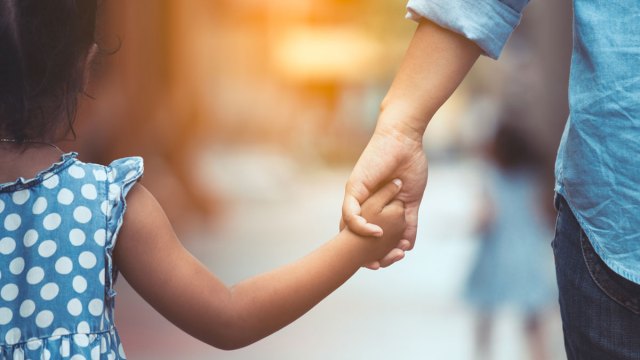One afternoon in the park, my tween and toddler were laughing together, kicking a glittery pink soccer ball. I was savoring this rare moment of sibling harmony when a mom I barely knew jumped in: “They’re adorable! What a HUGE age gap!”
“Did you do that on purpose?” another mom teased. “So you’d have a built-in babysitter?”
Now, as a bit of an over-sharer, there’s almost no topic I consider off-limits in the spirit of mom camaraderie. I’ve spent hours in the park talking about bodily fluids, boobs, and birth stories—but this time, I stomped on the brakes. Nope, not going there today!
I’ve been asked about the timing of my pregnancies a few too many times by near-strangers—women and men, parents and non-parents. Why do people feel so entitled to ask about women’s fertility? Why does our society treat pregnancy like something we can plug into a shared Google calendar or order up like an Amazon Prime delivery?
My close friends consoled me after the miscarriages, so of course they never asked about my kids’ age gap. The people who ask about it tend to be people I see around the neighborhood a lot but don’t know well: the preschool secretary, the swim teacher, the mom who pops up at all the birthday parties.
I was trying to extricate myself from that playground interrogation by kicking my kids’ soccer ball when another mom appeared. I was surrounded. “Wait! You have a middle kid, right? I’ve seen him around.”
“Nope, no middle kid,” I responded. “Two girls, seven years apart.” For the first time ever, I didn’t cave into pressure and elaborate on my story. Family planning involves some of the most taboo topics—sex, health, and money—and yet, most of us have no qualms about asking so-called casual questions like, “How many kids do you want?”
When I was planning for a second child but hadn’t started trying yet, I asked everyone I knew about their baby-making intentions. “So, are you going to give little Amy a brother or sister?” I asked a mom acquaintance as she pushed her three-year-old on the swings. When a cloud passed over her face, I realized what a painful question I’d asked. What I truly wanted to know was whether I was going to have a second child. That was what I should have talked about. If she wanted to share her own stuff, that would have provided an invitation, but it wouldn’t have been pushy.
Related: When You Realize Your ‘Mom Friends’ Aren’t Your Real Friends
After my long-awaited baby exploded into my life like a firecracker (in a 45-minute emergency birth), I remember feeling compelled to talk about my experiences with random people. I wanted to share everything about having a newborn and a seven-year-old! The prying questions didn’t bother me when I was eager to share. But now, I’m a little weary of people’s surprise at the age gap.
Hearing someone say, “That’s a big gap!” is like being told, “You’re really tall!” over and over again (something else I have experience with). Not only does it get old, but it also makes you feel othered. You feel like people are staring. And what can you say? “Yep, I’m tall!” “Yep, it’s a big age gap.”
However, a really interesting thing happened when I stopped engaging with strangers’ too-personal questions. I actually began feeling more sympathy toward borderline-rude people. The guy behind the counter at Rite Aid, for example, asked me the other day if I was happy having daughters. (What was I going to say in front of my girls, “No, I’m not happy with them”?) As the clerk packed up our pink toothpaste and L.O.L. dolls, he smiled and continued his line of questioning, “I mean, don’t you wish you had a boy? Are you trying for one?”
Over the years I’ve exchanged pleasantries with the clerk about our families, and I’ve always noticed how much he talks about his brothers. He loved growing up in a house of boys. Brothers defined his childhood, his identity. When people ask you intimate questions about your family, it’s almost always about them. It rarely has anything to do with you.
“I bet you had fun with brothers,” I said to the Rite Aid guy as we waved goodbye. “But sisters are awesome too!”
In the case of the playground moms, the more I got to know them and their meticulously planned kids, the more I understood that they were a worried bunch. They were constantly fretting about how their kids were getting along with their siblings and whether they were getting into all the “right” schools, camps, and activities. They wanted to make sure everything was lined up perfectly and in order.
So when they saw my outlier family, they stared; they scrutinized. And what did they see? They saw two sisters kicking a soccer ball, two sisters laughing in the sun. This beautiful picture is how things can look when they don’t turn out as planned. When it comes to having children, we must embrace the messy beauty, the serendipity of it all. After all, we can’t plan the best parts.











